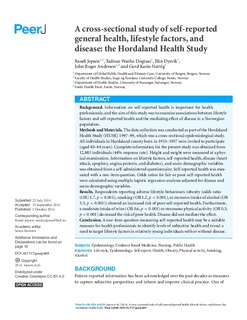A cross-sectional study of self-reported general health, lifestyle factors, and disease: the Hordaland Health Study
Journal article, Peer reviewed
Permanent lenke
http://hdl.handle.net/11250/222930Utgivelsesdato
2014Metadata
Vis full innførselSamlinger
Originalversjon
Jepsen et al. (2014), A cross-sectional study of self-reported general health, lifestyle factors, and disease: the Hordaland Health Study. PeerJ 2:e609; DOI 10.7717/peerj.609 10.7717/peerj.609Sammendrag
Background. Information on self-reported health is important for health
professionals, and the aim of this study was to examine associations between lifestyle
factors and self-reported health and the mediating effect of disease in a Norwegian
population.
Methods andMaterials. The data collection was conducted as part of the Hordaland
Health Study (HUSK) 1997–99, which was a cross-sectional epidemiological study.
All individuals in Hordaland county born in 1953–1957 were invited to participate
(aged 40–44 years). Complete information for the present study was obtained from
12,883 individuals (44% response rate). Height and weight were measured at a physical
examination. Information on lifestyle factors, self-reported health, disease (heart
attack, apoplexy, angina pectoris, and diabetes), and socio-demographic variables
was obtained froma self-administered questionnaire. Self-reported health was measured with a one-item question. Odds ratios for fair or poor self-reported health
were calculated using multiple logistic regression analyses adjusted for disease and
socio-demographic variables.
Results. Respondents reporting adverse lifestyle behaviours (obesity (odds ratio
(OR) 1.7, p < 0.001), smoking (OR 1.2, p < 0.001), or excessive intake of alcohol (OR
3.3, p < 0.001)) showed an increased risk of poor self-reported health. Furthermore,
a moderate intake of wine (OR 0.6, p < 0.001) or strenuous physical activity (OR 0.5,
p < 0.001) decreased the risk of poor health.Disease did not mediate the effect.
Conclusion. A one-item question measuring self-reported health may be a suitable
measure for health professionals to identify levels of subjective health and reveal a
need to target lifestyle factors in relatively young individuals with or without disease.
